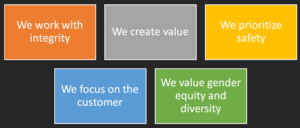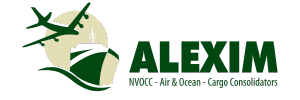
Ethics Code
This code promotes integrity, transparency and responsibility in all logistics operations, guaranteeing respect for customers, suppliers and the environment.

ETHICS CODE AND POLICY OF CONDUCT
PURPOSE
Our Code of Ethics and Conduct contains values, principles, and standards that will guide us to adapt to the new and complex realities of the market and the challenges of our organization, as well as to the different areas where we carry out our activity.
The purpose of this Code is to communicate our beliefs and standards as an organization in building a corporate culture of integrity, based on ethical values essential to maintaining an economically viable and sustainable business.
It will also guide us to know and understand the policies and principles that define how we want to do business, to make decisions consistent with them, and to be informed about what behaviors we demand as an organization.
SCOPE
This applies to all managers and employees of the organization, regardless of the type of contract that determines their employment relationship; as well as all our clients, business partners, contractors, suppliers, and other collaborating companies, who are an extension of the organization and, therefore, must act as indicated in this document. All of them will be called Members of the organization.
OUR VALUES
The organization is governed by the following values:

ROLES OF ORGANIZATION MEMBERS
- All employees
Every employee of the organization must act with integrity and respect the currently applicable legal framework, as well as adhere to the provisions of this Code of Ethics and Conduct of the organization.
The organization’s employees must promote, both within the organization and among its interest groups and society in general, a culture based on integrity. Thus, they must seek to positively influence through the values and culture of the organization.
If they have any questions, concerns, complaints, or complaints, employees may contact their direct boss or Manager, the SIG Coordinator, or through the Organization’s Improvement Channel, through which the most appropriate measures will be taken timely.
Everything indicated in this Code constitutes an obligation for the employees of the organization, even when it has not been expressly indicated in that sense.
- All leaders
If you have a supervisory position or a position of trust or have personnel in charge in the organization – the level of responsibility and compliance with this Code is even higher than that of other employees.
Leaders will have the special responsibility of guiding their subordinates with integrity, setting an example daily positively influencing the team of employees, promoting ethical conduct, and complying with current legal and internal provisions, assuming with commitment their obligations to the organization, its employees, society and interest groups in general.
RULES OF ETHICS AND CONDUCT
Diversity, equal opportunities, and respect
-
- Offer and foster an environment of cultural plurality and diversity that allows employees to perform with equal opportunities, respect, dignity, justice, and courtesy.
-
- Promote a space of respect, in which any act of harassment or sexual harassment is openly and categorically rejected, inside and outside the offices and facilities of the organization, as well as any act of workplace hostility. We make sure to keep the reporting, prevention, and sanction mechanisms for these types of acts, the confidentiality of the complainant, as well as the corresponding protection mechanisms up to date.
-
- Cultivate and foster team spirit, so that relationships are built based on trust, with the certainty that the employee is personally and professionally committed to doing the right thing.
-
- Promote a workplace that respects the fundamental rights of employees, both individually and through union groups. This translates into complying with current labor laws and regulations, as well as respecting the different opinions of employees.
-
- Listen to employees through open and honest communication.
-
- Value the divergent perspectives of employees, as well as those who question their points of view.
-
- Require employees to treat their co-workers and job applicants respectfully, without discriminating based on race, color, sex, origin, language, religion, gender, sexual orientation, disability, age, economic situation, ethnicity, political or other preferences.
-
- Respect the workspace and employees, ensuring that the reputation and good image of the organization are kept high.
-
- Promote the professional growth of employees, through continuous learning. This includes promoting practices that recognize and reward work performance and merits obtained.
-
- Likewise, we promote timely, transparent, and constructive feedback which must refer to concrete examples to help the continuous improvement of our workers.
-
- Promote a fair work environment, without favoritism. If there is the possibility of hiring family members of employees, the responsible area must be informed and approval requested to avoid potential conflicts of interest.
-
- Encourage open and honest communication. Value the perspectives of those who disagree with us, as well as those who question our point of view. Practice empathy, listen, understand the other’s point of view, and then present our own.
-
- Maintain adequate conditions and benefits for all employees and establish fair compensation based on the criteria of Meritocracy.
Free association and union activity
-
- Respect the freedom of association of employees, recognizing that everyone has the right to belong to a union and participate in collective bargaining.
-
- Said participation in the Trade Unions must be executed under the values of Integrity and Responsibility of the organization, considering that, above all, the employee is part of the organization and is due to its values.
-
- If an employee belongs to a union, he or she is expected to always tell the truth and not spread false or distorted information to favor union interests.
-
- All employees who belong to a union and promote a strike must do so following the Collective Relations Law, which defines a strike as follows: «A strike is the collective suspension of work agreed by the majority and carried out voluntarily. and peaceful by the employees, with the abandonment of their workplace.
-
- Untimely stoppage with employees remaining in the workplace, obstruction of employees’ entry to the workplace, damage to property, threats or violent acts against the organization’s personnel, or the intentional decrease in production in the workplace grievance of the organization, are not recognized or accepted forms of strike or protest.
Safe and healthy environment
-
- For us, safety is one of the most important values: if we cannot work safely, activities stop. In that sense, the lives and integrity of people are valued to the maximum, which is why a culture of safety based on prevention is promoted.
-
- Likewise, the healthiest work environment and conditions for employees, contractors, and visitors must be ensured. No organizational goal, cost or time savings, or other competitive advantage, justifies putting people’s physical integrity and health at risk.
-
- The use, possession, or sale of drugs will not be permitted under any circumstances. Nor is it acceptable to consume alcohol in the organization’s facilities, nor to enter under the direct or indirect effects of alcohol, or drugs that impair the ability and normal performance of the employee (except drugs prescribed by a doctor following the guidelines of the organization). security and health).
-
- Visitors will be provided and required to take the necessary health and safety measures, in addition to monitoring compliance on the premises.
-
- The practice of these standards will be promoted, sharing them with suppliers and clients.
-
- Action will be taken quickly when reporting risks or incidents that allow timely and necessary decisions to be made. Then, the events that occurred will be analyzed to learn from them.
Transparency and integrity in our actions
-
- In the organization, the organization’s resources and assets will be cared for and used responsibly, honestly, efficiently, and appropriately.
-
- The facilities assigned by the organization will be used (including electronic media and communication systems).
-
- communication exclusively) to fulfill the functions entrusted to employees. These will be used responsibly and appropriately.
-
- Under no circumstances harmful organization’s assets be used for illegal, harmful, or offensive purposes towards the organization or third parties.
-
- The services of the organization’s suppliers or contractors will not be used for personal benefit or illegitimately.
-
- We are aware that our expenses cannot be used for payments related to fraud, public and/or private corruption, drug trafficking, money laundering, or terrorist financing.
-
- Employees must declare conflicts of interest when performing their duties, whether potential, real, or apparent. Commitments and relationships will be carefully evaluated, so that there is transparency and loyalty towards the organization and its shareholders.
-
- Under no circumstances will you take advantage of opportunities for personal enrichment that arise both in the exercise of functions and in the use of resources of the organization.
-
- Gifts or hospitality may not be given or received to improperly influence the decisions of the person receiving them, going against legal regulations or the policies of the organization. If there is any type of conflict of interest, the fact will be communicated to the direct boss, who must report it directly to Human Resources and the Legal area. In case of doubt, it will be consulted through the channels provided by the organization.
-
- The link with the media will only be established through the official spokespersons designated by the organization. Likewise, employees will need express authorization to become spokespersons for the organization and address the press or media, either through official channels and/or social networks.
Responsible use of the authority granted.
-
- We do not take advantage of our position in the organization to benefit ourselves personally or to benefit third parties in any action, contract, operation, or management that involves the organization.
-
- If we participate in the management of the organization and, at the same time, we oversee the total or partial management of the assets of another person or company, we do not benefit one to the detriment of the other.
-
- The internal standards – policies, procedures, controls, among others – established in the organization will be respected and, even more so, complied with, contributing to its continuous improvement over time.
-
- We are committed to protecting the corporate image and reputation, assets, and culture of the organization. Therefore, appropriate precautions are taken to prevent risks and sanction irregular acts.
-
- Professionalism and objectivity guide the work activities of the organization’s employees, which will allow the identification and timely reporting of those activities of employees or third parties that could damage the image of the organization.
-
- In situations that put the organization at risk, the appropriate levels will be consulted before acting, to avoid exceeding the delegated authority.
-
- Act with prudence and responsibility when selecting employees, suppliers, clients, and strategic partners, evaluating the level of economic and reputational risk, as well as alignment with the culture of the organization, applying due diligence procedures.
-
- Third parties acting on behalf of the organization in the public and private spheres will be required to understand and comply with the organization’s guidelines and to this end their performance will be monitored.
Protection of reserved information and intellectual property
-
- It is the organization’s priority to protect the personal and confidential information of its employees, clients, or third parties. Likewise, employees must protect the confidential and privileged information of the organization to which they have access. If the employment or business relationship has ended, said information will be handled following the law and the policies that may be in force.
-
- No privileged information will be used for purposes other than those of the organization, personal benefit, or that of third parties.
-
- Likewise, all information and/or material is protected from being reproduced and/or distributed through printed or electronic media, respecting the confidentiality provisions of the agreements.
-
- All property rights, as well as the intellectual capital of the organization, are guaranteed.
-
- Those signs and symbols of the organization’s identity will be used correctly and consistently, as they reflect those who make up the organization and the internal culture of the organization.
-
- Confidentiality will be maintained regarding the information and documents produced, originated, provided, and obtained due to the activities that the employee carries out, without putting the security or interests of the organization at risk.
-
- The organization reserves the exclusive right to disclose its intellectual capital with third parties.
-
- We are committed to the appropriate and responsible use of our communication devices and ensure that our communications are appropriate and respectful.
Responsible representation of the organization and strengthening its reputation
-
- It will contribute responsibly and proactively to the good image and reputation of the organization. To this end, it is important not to confuse actions in a personal capacity with those actions carried out by employees on behalf of the organization.
-
- The representation of the organization is exercised by the powers granted and, exclusively, for the needs of the job and function. Its exercise is carried out by the policies, procedures, and standards of the organization.
-
- If representatives of the organization are recognized in work activities, they must act accordingly; that is, always maintaining a professional attitude.
-
- We act with prudence and responsibility when selecting the organization’s workers, evaluating the level of economic and reputational risk, and applying due diligence procedures.
Relationship with customers
-
- We are upright professionals; always we act ethically, generating transparent and trusting relationships, and maintaining and strengthening ties with our clients through the delivery of quality products and services.
-
- The trust and loyalty of our customers is a priority for us. For us, transparency in negotiations is the best letter of introduction of the organization, which is framed within the policies of the commercial area.
Relationship with suppliers
-
- The organization’s suppliers contribute to the objectives set and the achievements obtained by the organization. This recognition only demonstrates that the negotiation, selection, and exchange processes with them have been truthful, fair, and careful.
-
- All suppliers may participate in the different selection processes, under the same conditions and opportunities. Both merit and qualifications will be important when evaluating proposals for supplier selection. This process is carried out without favoritism or discrimination based on race, religion, nationality, color, sex, gender, sexual orientation, identity, age, or disability.
-
- Suppliers, contractors, and all those who make up the organization’s interest groups deserve the same respect and dignified treatment. Therefore, we fully comply with promises, commitments, agreements, and contracts.
Environmental protection
-
- We understand the importance of the impact on the environment for present and future generations, and for the sustainability of businesses. For this reason, we are committed to the conservation of the ecosystems that surround us and to the development of our activities from an environmentally sustainable approach.
-
- We promote the efficient and sustainable use of natural and productive resources, with special emphasis on the culture of protection, respect, and care of the environment, recognizing biodiversity and natural ecosystems in the areas of influence of the organization.
-
- We value interacting with third parties and suppliers who maintain good environmental standards. An effort will be made to maintain commercial relationships only with third parties that have implemented good environmental standards and promote the correct use of resources among their employees and third parties with whom they relate as part of the supply chain.
Compliance with laws, rules, and regulations
-
- The organization strictly complies with the laws, regulations, and standards of the country where it operates. In that sense, the organization expects all employees, suppliers, and clients to act following the laws and always do the right thing, even if the regulations lack specific guidance.
-
- If legal regulations establish provisions different from those of the Code and the policies of the organization, it is expected that the strictest rule of conduct will be followed.
Bribery prevention
-
- We always act with integrity and transparency, following the rules, guidelines, and principles of good corporate governance; and by the commitment made by the organization to its shareholders, partners, clients, suppliers, employees, and the community.
-
- We do not accept or offer any type of bribe or any other type of improper benefit, either directly or through third parties, whose objective is to obtain an improper advantage.
-
- We condemn acts of terrorism in all their forms and manifestations, regardless of who commits them, where, and their purposes.
-
- We do not tolerate acts of public and/or private corruption, influence peddling, money laundering, financing of terrorism, or other illicit conduct described in the Penal Code. In this sense, we are committed to complying with the provisions of the laws applicable to the organization and/or its shareholders; as well as to taking the necessary actions to protect the reputation of the organization to prevent the organization’s employees and third parties who may represent us from failing to comply with the guidelines established in our policies.
-
- We encourage all employees to feel free and safe to consult leaders when they are not sure whether a behavior is appropriate or not.
-
- We report to the Ethics Channel any suspicion of non-compliance or irregular activity of employees or third parties with whom the organization relates.
-
- We support local and international efforts to prevent illegal activities.
-
- We comply with the protection of human rights in all the activities we carry out, by the provisions of the Universal Declaration of Human Rights.
Prevention of money laundering and terrorist financing
-
- We define and adopt the mechanisms and rules of conduct that prevent, and control activities linked to money laundering and terrorist financing.
-
- We are governed by the following principles and ethical duties regarding the Prevention of Money Laundering and Financing of Terrorism:
-
- Respect and compliance with the rules: Comply with current regulations in the fight against money laundering and terrorist financing, as well as this Code of Conduct and the policies for the prevention of money laundering and terrorist financing.
-
- Impartiality: Evaluate with objectivity and the required diligence the information in your charge to detect unusual and suspicious operations and, where appropriate, issue the corresponding reports, demonstrating independence and ruling out conflicts of interest with people and institutions.
-
- Truthfulness: Express yourself truthfully and act honestly in the exercise of your activities and performance of your duties, as well as with clients and third parties.
-
- In no case will the organization adopt retaliation against its employees, suppliers, clients, counterparties, or other third parties who comply with notifying actions or other obligations arising from the law.
Human and mineral rights in conflict
-
- The organization adheres to the United Nations Universal Declaration of Human Rights and respects these rights wherever it operates.
-
- All forms of torture, cruelty, inhuman treatment, and/or forced labor, as well as the indiscriminate use of force and child labor, are rejected by the organization. Likewise, the organization repudiates any form of discrimination based on race, religion, color, gender, sexual orientation, or any other nature.
-
- It is necessary to recognize those negative impacts on human rights caused by the organization’s activity, whether through indirect contribution or because they are directly related, as they must be mitigated.
Situations not contemplated.
-
- Although the Code of Ethics and Conduct brings together the main guidelines on how the organization’s employees should carry out their activities, it does not explicitly contemplate all critical situations. Therefore, if in any complex circumstance, there are doubts about how to act, the employee must ask himself:
-
- If the answer to any of these questions is “No”, the employee probably should not proceed or decide. If despite this, the employee still hesitates, she should seek help or consult with the leaders of her area or the General Manager.
Inquiries or communications of concerns
-
- To prevent a concern from becoming a serious problem, it is necessary for the employee to raise his doubts and questions to his superiors. Likewise, if you consider that the conduct of any employee fails to comply with the provisions of this Code, you must immediately provide the information, by that is stated in this section. Otherwise, knowledge cannot be taken to evaluate the case, nor can it be resolved with appropriate measures. In those cases:
-
- Talk to the immediate boss or area manager, who must communicate it to the ethics channel.
-
- Report through the Ethics Channel.
-
- If any third party has a question or concern or if they consider that the conduct of any employee of the organization or third party of any kind fails to comply with the provisions of this Code, they must report it through the Ethics Channel.
ETHICS CHANNEL
As a tool for confidential and private use, this Ethics Channel will receive inquiries from employees in a responsible manner, to resolve their concerns about actions that they consider unrelated and contrary to the Code of Ethics and Conduct, or internal policies and procedures, applying the corresponding disciplinary sanctions.
The organization positively values the individual commitment of its employees to comply with this obligation. Therefore, there will be no harm or retaliation against those who report their concerns in good faith. On the contrary, the identity of those who use this Ethics Channel will be safeguarded and protected.
It is important to provide as much information as possible when reporting a situation, thus facilitating its analysis and review.
A complete report should help answer these questions:
- Who is involved? (names and positions)
- What happened? What did you do?
- When and where did it happen?
- How long did it happen?
- Is this situation still happening?
- Where is there evidence or support that can be validated by the organization?
- Who else knows about this situation?
- Has this fact been communicated previously? How? What happened?
Being witnesses and not accomplices: that is the objective of this channel to report irregular or illegal conduct or acts in the organization.
These are the access routes to the channel: canaletico@alexim.com
APPLICABLE MEASURES IN CASE OF NON-COMPLIANCE
The company may apply disciplinary sanctions in case of non-compliance with this Code of Ethics and Conduct, standards and/or policies of our organization, current regulations, and the law. These sanctions may even mean the termination of the employment or contractual relationship and give rise to the promotion of legal actions that may correspond.
Likewise, anyone who in bad faith makes false reports or complaints and/or lies or obstructs the investigation of an ethical case will be subject to the sanctions.
DOWNLOAD DOCUMENTS





